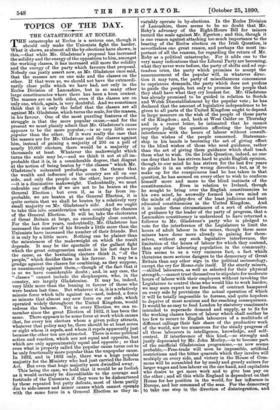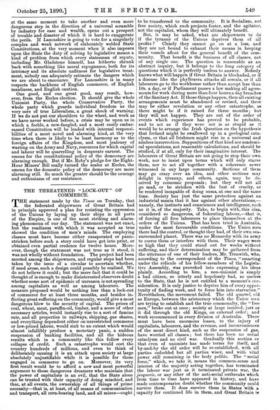TOPICS OF THE DAY.
■ 411.■
THE CATASTROPHE AT ECCLES. THE catastrophe at Eccles is a serious one, though it should only make the Unionists fight the harder. What it shows, as almost all the by-elections have shown, is this,—that while Mr. Gladstone's proposal has increased the solidity and the energy of the opposition to him, amongst the working classes, it has increased still more the solidity and the energy of the party which favours that proposal. Nobody can justly assert now, as Mr. Gladstone once said, that the masses are on one side and the classes on the other. If that were so, we should not have the extraordi- narily close polls which we have had, not only in the Eccles Division of Lancashire, but in so many other large constituencies where there has been a keen contest. The masses are on both sides, even if the classes are on only one, which, again, is very doubtful. And we sometimes think that it is only the belief that the classes are all against Mr. Gladstone, which turns the scale, for the masses, in his favour. One of the most puzzling features of the struggle is that the more popular cause,—and for the present we must plainly admit that Mr. Gladstone's cause appears to be the more popular,—is so very little more popular than the other. If it were really the case that the masses are for Mr. Gladstone and the classes against him, instead of gaining a majority of 205 on a poll of nearly 10,000 electors, there would be a majority of thousands at least. Whatever the makeweight which turns the scale may be,—and we think it not at all im- probable that it is, in a considerable degree, that disgust at the notion of being beaten by " the classes " which Mr. Gladstone's reiterated preludings on the theme that the wealth and influence of the country are all on one side, and only the people on the other, have produced, —it is a diminutive makeweight. Undoubtedly, we must redouble our efforts if we are not to be beaten at the General Election ; but even if, as is far from im- probable, we are beaten at the General Election, it is quite certain that we shall be beaten by a relatively very small majority on Mr. Gladstone's side. And we ought to take this into consideration when counting the chances of the General Election. It will be, take the electorates of Great Britain at large, an exceedingly close contest. For the last few years, undoubtedly, Mr. Gladstone has increased the number of his friends a little more than the Unionists have increased the number of their friends. But it is only by a little more. Nothing can be plainer than the minuteness of the makeweight on which the result depends. It may be the spectacle of the gallant fight which the great octogenarian makes in his last days for the cause, as the hesitating electors think it, " of the people," which decides them in his favour. It may be a grudge against the classes for combining, as they suppose, so unanimously against them,—though of the fact that it is so we have considerable doubt ; and, in any case, the " classes " cannot include the shopkeepers, who, in the country, are largely Gladstonian. It may be, indeed, very little more than the leaning in favour of those who were beaten last time. But whatever it is, it is a relatively minute force which tells against us,—and, indeed, a force so minute that almost any new force on our side, which operated widely throughout the United Kingdom, would redress the balance. Yet in every Election we can re- member since the great Election of 1832, it has been the same. There appears to be some force at work which causes that, for every ten electors whom a given policy attracts, whatever that policy may be, there should be at least seven or eight whom it repels, and whom it repels apparently just because the other ten are attracted. There is some political action and reaction, which are not equal and opposite, but which are only approximately equal and opposite ; so that even what is properly called the popular cause turns out to be only fractionally more popular than the unpopular cause. In 1832, and in 1832 only, there was a huge popular majority for the Ministry who had just carried the Reform Act. But even that huge majority soon dwindled away. This being the case, we hold that it would be as foolish as it would certainly be discreditable to the courage and fortitude of the Unionists, if they were to be disheartened by these repeated but petty defeats, most of them partly due to side-issues and minor causes which cannot operate with the same force in a General Election as they in- variably operate in by-elections. In the Eccles Division of Lancashire, there seems to be no doubt that Mr. Roby's advocacy of the Eight-Hours Bill for miners turned the scale against Mr. Egerton ; and this, though it is one reason against attaching too much importance to the bearing of the Eccles election on the Irish Question, is nevertheless one great reason, and perhaps the most im- portant of all the reasons, for regarding the return of Mr. Roby as a political catastrophe. For it adds one to the very many indications that the Liberal Party are becoming-, what they never were before, the party of shifts and ad cap- tandum cries, the party which promises to accept the announcement of the popular will, in whatever direc- tion it may turn, the party of miscellaneous concessions to capricious demands, the party which does not profess to guide the people, but only to promise the people that they shall have what they cry loudest for. Mr. Gladstone has already promised to be guided in relation to Scotch and Welsh Disestablishment by the popular vote ; he has declared that the amount of legislative independence to be given to all parts of the United Kingdom ought to depend in large measure on the wish of the people of those parts of the Kingdom ; and, both at West Calder on Thursday and in a recent letter, he intimated that he cannot properly judge the question affecting the legislative interference with the hours of labour without consult- ing the wishes of the people concerned. Statesman- ship in his hands is becoming the art of giving effect to the blind wishes of those who need guidance, rather than the art of giving them guidance which shall teach them what to wish. On the Irish Question, indeed, no one can deny that he has striven hard to guide English opinion, though to our mind he has striven for the last five years- to guide it in an utterly wrong direction ; but, as if to make up for the conspicuous lead he has taken in that question, he has seemed on every other to wish to conform himself more and more to the blind instincts of the constituencies. Even in relation to Ireland, though he sought to bring over the English constituencies to• his own mind, he avowedly formed his own mind on the minds of eighty-five of the least judicious and least educated constituencies in the United Kingdom. And it is under these circumstances of a sort of abdication of guidance by the leader of the party of progress, that a. Lancashire constituency is understood to have returned a follower to Mr. Gladstone's party who is pledged to vote for the interference of the Legislature to limit the hours of adult labour in the mines, though these same miners have done more already in gaining for them- selves, without any such legislative interference, the limitation of the hours of labour for which they contend, than any other labouring population in the community.. This seems to us a very ominous fact, a fact which threatens more serious dangers to the democracy of Great Britain than any other sign in the political meteorology, except the cry for Home-rule itself. If the sturdy miners, —skilled labourers, as well as selected for their physical strength,—cannot trust themselves to stipulate for moderate hours of labour with their employers without invoking the Legislature to control those who would like to work harder, we may soon expect to see freedom of contract hampered on every side by provisions the actual operation of which it will be totally impossible to foresee, and quite hopeless to deprive of most noxious and far-reaching consequences. It would be as easy to feed London by statutory enactments intended to supersede demand and supply, as to fix for the working classes hours of labour which shall neither be too few to secure to English labourers of a multitude of different callings their fair share of the productive work of the world, nor too numerous for the steady progress of all these labourers in intelligence, knowledge, and self- control. If interference of this Lind,—so strongly and, justly deprecated by Mr. John Morley,—is to become part. of the unofficial Gladstonian programme,—as now seema probable,—Free-trade will soon be impossible, artificial restrictions and the bitter quarrels which they involve will multiply on every side, and victory in the House of Com- mons will be scrambled for by needy and greedy suitors for larger wages and less labour on the one hand, and capitalists who desire to get more work and to give less pay on the other ; and all this while England is dependent on that House for her position in the world, for her influence in Europe, and her command of the seas. For the democracy to take one step in the direction of disintegration, and at the same moment to take another and even more dangerous step in the direction of a universal scramble by industry for ease and wealth, opens out a, prospect of trouble and disaster of which it is hard to exaggerate the perils. If Lancashire is going to vote for a singularly complex and weak network of elaborately welded State Constitutions, at the very moment when it also imposes upon the State the duty of solving by legislative means a kind of problem from which every statesman of repute, including Mr. Gladstone himself, has hitherto shrunk back with something like moral repugnance, both for its intricacy and its absolute unfitness for legislative treat- ment, nobody can adequately estimate the dangers which we are about to encounter. For Lancashire is in many respects the backbone of English commerce, of English manliness, and English caution. One good, and one great good, may result, how- ever, from the Eccles election. It should give the whole Unionist Party, the whole Conservative Party, the whole party which guards individual freedom as the very core of true Liberalism, a great shock of warning. If we do not put our shoulders to the wheel, and work as we have never worked before, a crisis may be upon us in which a feeble, a new-fangled, and a most easily embar- rassed Constitution will be loaded with internal responsi- bilities of a most novel and alarming kind, at the very time when there is likely to be least harmony as to the foreign affairs of the Kingdom, and most jealousy of wasting on the Army and Navy, resources for which capital and labour will be quarrelling in desperate earnest. The omens for the constitutional policy of the democracy are alarming enough. But if Mr. Roby's pledge for the Eight- Hour Miners' Bill really turned the scales at Eccles, the omens for the domestic policy of the democracy are more alarming still. So much the greater should be the courage and enthusiasm of our resistance.







































 Previous page
Previous page